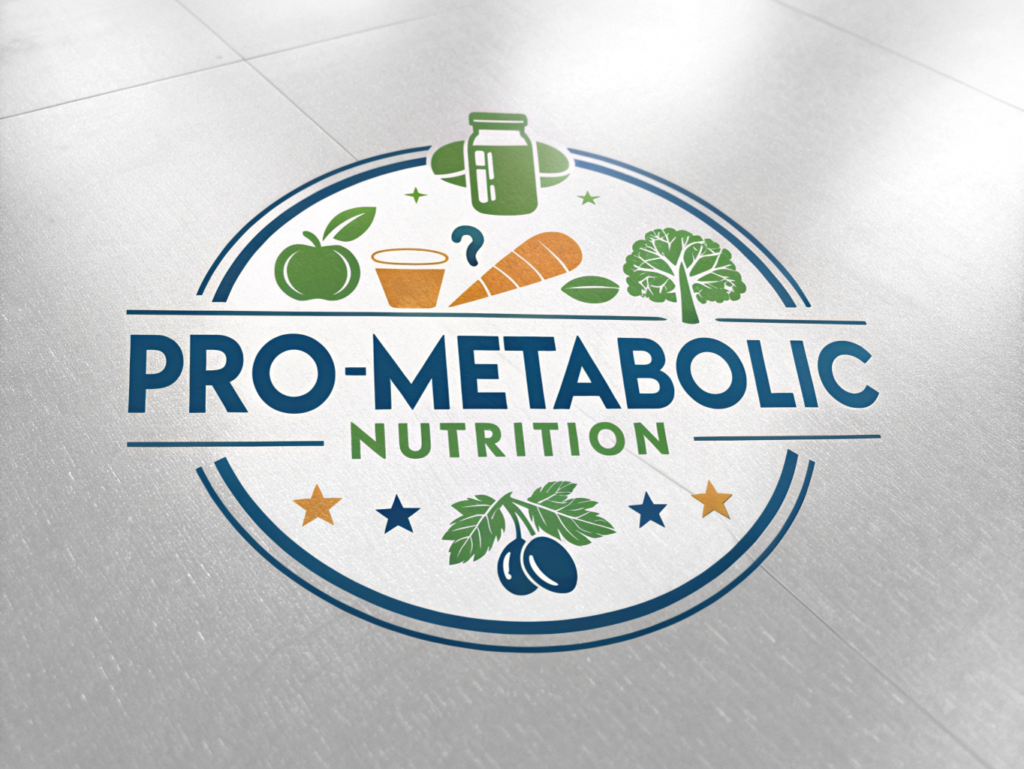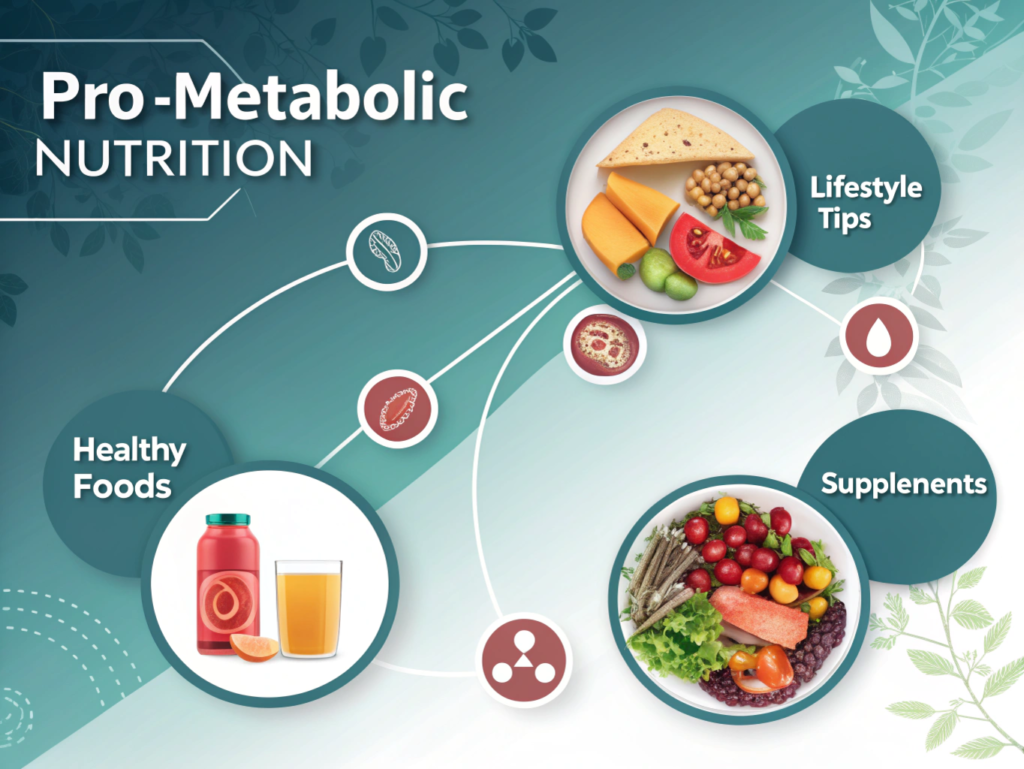Introduction: My Metabolic Awakening
The numbers on the scale kept climbing despite my dedicated efforts to eat “clean” and exercise regularly. My energy levels plummeted, sleep became elusive, and the persistent chill in my hands and feet remained—regardless of how many layers I wore. Sound familiar?
Like many health-conscious individuals, I had inadvertently trapped myself in a cycle of restrictive eating patterns and excessive cardio sessions that were secretly sabotaging my metabolic health. The “healthy” lifestyle I proudly maintained was actually slowing my metabolism to a glacial pace.
My breakthrough moment arrived when discovering pro-metabolic nutrition principles—an approach that transformed not just my physical vitality but revolutionized my entire relationship with nourishment. If you’re currently wrestling with unexpected weight fluctuations, persistent fatigue, or feel imprisoned by food rules that seem to yield diminishing returns, the metabolic wisdom shared in this guide might become your pathway to genuine wellbeing.
tabe of contents

What Is Pro-Metabolic Nutrition?
Pro-metabolic nutrition represents a fundamental shift from conventional dietary thinking. Rather than emphasizing restriction and limitation, this approach centers on supporting your body’s natural metabolic processes through strategic nourishment.
At its core, pro-metabolic nutrition focuses on providing your body with the precise nutrients needed to efficiently convert food into usable energy. Unlike many contemporary dietary frameworks that restrict calories or eliminate entire food categories, pro-metabolic eating prioritizes:
- Nutrient density over arbitrary calorie mathematics
- Enhancement of metabolic rate through intentional food selection
- Thoughtful balance of macronutrients (proteins, carbohydrates, and fats)
- Support for optimal hormonal function, with particular attention to thyroid health
- Consistent eating patterns that maintain blood sugar stability
The Science Behind Metabolism
Your metabolism encompasses far more than the simplistic “calorie-burning furnace” often portrayed in fitness magazines. In reality, it represents the entire collection of chemical processes that sustain life within your body. These sophisticated processes include:
- Converting consumed food into cellular energy (catabolism)
- Utilizing that energy to construct and repair cellular components (anabolism)
- Efficiently eliminating metabolic waste products
- Maintaining optimal body temperature
- Orchestrating balanced hormone production throughout bodily systems
Recent research from the Journal of Physiology demonstrates that metabolic health markers respond dramatically to nutritional quality—not just quantity. Studies show that when subjects transition from calorie-restricted diets to nutrient-focused approaches, measurements like body temperature, resting metabolic rate, and thyroid hormone levels frequently normalize, even when caloric intake increases.
Historical Perspective: From Ray Peat to Modern Metabolic Health
The Pioneering Work of Ray Peat
The foundations of contemporary pro-metabolic nutrition draw substantially from the research of Ray Peat, Ph.D., whose decades of work investigating the intricate relationships between hormones, metabolism, and nutrition challenged many established dietary dogmas.
Peat’s approach diverged significantly from mainstream nutritional guidelines by advocating for:
- Sufficient consumption of natural sugars for cellular fuel
- Adequate protein intake from easily digestible sources
- Balanced inclusion of saturated fats for hormonal production
- Conscious minimization of polyunsaturated fatty acids (PUFAs)
- Strategic incorporation of micronutrients, particularly minerals that support metabolic processes
This framework has evolved considerably since Peat’s initial research, with modern practitioners integrating emerging research in endocrinology, nutritional biochemistry, and metabolic health. Contemporary pro-metabolic approaches maintain the core emphasis on supporting natural bodily functions while incorporating individualized considerations for diverse health needs.
The Pro-Metabolic Food Pyramid
Foundation Foods for Metabolic Health
The foods that form the foundation of pro-metabolic nutrition share common characteristics: they’re nutrient-dense, minimally processed, and contain compounds that actively support metabolic function.
| Food Category | Examples | Metabolic Benefits |
|---|---|---|
| Quality Proteins | Grass-fed beef, pasture-raised eggs, wild-caught shellfish, properly sourced dairy | Complete amino acid profiles for cellular repair, significant thermogenic effect, hormone precursors |
| Natural Carbohydrates | Ripe seasonal fruits, raw honey, pure maple syrup, properly prepared root vegetables | Readily available glucose for cellular energy production, liver glycogen restoration, thyroid support |
| Saturated Fats | Grass-fed butter, coconut oil, tallow from grass-fed animals | Support for hormone synthesis, cellular membrane integrity, brain function |
| Pro-Metabolic Fruits | Fresh-squeezed orange juice, pineapple, cherries, tropical varieties | Readily accessible vitamins, antioxidant compounds, naturally balanced sugars |
| Mineral-Rich Foods | Homemade bone broth, Celtic sea salt, oysters and shellfish | Electrolyte balance maintenance, enzymatic function support, cofactors for metabolic pathways |
Foods to Minimize or Avoid
Equally important to understanding what supports metabolism is recognizing which dietary elements potentially suppress metabolic function:
- Industrial seed oils high in polyunsaturated fatty acids (corn, soybean, canola oils)
- Ultra-processed food products containing artificial additives and preservatives
- Large quantities of raw cruciferous vegetables (which contain natural thyroid inhibitors)
- Excessive caffeine that can disrupt adrenal function and stress hormones
- Extremely lean protein sources consumed without accompanying fats
Nutritional biochemistry research reveals that certain fats, particularly polyunsaturated varieties found in industrial seed oils, can suppress thyroid function and increase inflammatory markers. Meanwhile, nutrient-dense animal products provide essential fat-soluble vitamins and minerals critical for metabolic processes that plant sources simply cannot match in bioavailable forms.

The Pro-Metabolic Lifestyle: Beyond Food
Sleep and Metabolism
Quality sleep serves as a non-negotiable foundation for metabolic health because:
- Growth hormone—essential for tissue repair and regeneration—releases primarily during deep sleep phases
- Insulin sensitivity substantially improves with adequate restorative rest
- Stress hormones like cortisol normalize through consistent sleep patterns
- Core body temperature regulation depends heavily on undisturbed circadian rhythms
Research from the American Journal of Physiology demonstrates that even short periods of sleep disruption can reduce resting metabolic rate by up to 8% and alter glucose metabolism. Prioritizing 7-9 hours of quality sleep represents one of the most powerful pro-metabolic practices available.
Stress Management
Chronic stress elevates cortisol levels, which can systematically undermine metabolic health by:
- Increasing blood glucose levels unnecessarily
- Promoting disproportionate fat storage, particularly around abdominal regions
- Actively suppressing thyroid hormone conversion
- Disrupting digestive processes and nutrient absorption
Incorporating mindful stress-reduction techniques—whether through breathwork practices, nature immersion, social connection, or creative expression—proves equally important as dietary considerations for supporting metabolic function.
Exercise for Metabolic Health
Not all physical activity equally supports metabolic health. The pro-metabolic approach to movement strategically favors:
- Progressive strength training over excessive cardio sessions
- Regular walking and low-intensity, pleasurable movement
- Brief, intentionally intense workouts rather than prolonged exhaustive sessions
- Adequate recovery periods between training stimuli
Research published in the Journal of Applied Physiology shows that metabolic markers improve more significantly with resistance training combined with strategic recovery than with endurance-focused programs, particularly for individuals with compromised metabolic function.
Common Metabolic Disruptors
Environmental Factors
Modern environments present numerous challenges to metabolic harmony:
- Endocrine-disrupting chemicals lurking in plastics, personal care items, and household products
- Heavy metal exposure through contaminated food, water, and air
- Electromagnetic field exposure from proliferating technological devices
- Compromised air and water quality in many residential and work environments
Practical steps to minimize these influences include filtering drinking water, choosing glass containers over plastic, selecting clean personal care products, and creating technology-free zones within living spaces.
Nutritional Imbalances
Even well-intentioned dietary patterns can sometimes undermine metabolic health:
- Chronic calorie restriction that signals resource scarcity to bodily systems
- Insufficient protein consumption for cellular maintenance and repair
- Unaddressed micronutrient deficiencies (particularly magnesium, zinc, and vitamin D)
- Excessive consumption of polyunsaturated fats that interfere with cellular energy production
Addressing these imbalances through targeted nutritional strategies often yields dramatic improvements in metabolic function, frequently within weeks of implementation.
Signs Your Metabolism Needs Support
Physical Indicators
Your body communicates metabolic distress through reliable physical signals:
- Persistently cold extremities (hands and feet)
- Basal body temperature consistently below 97.8°F
- Chronic fatigue and energy fluctuations throughout the day
- Sluggish digestive function and irregular elimination
- Thinning hair or increasingly brittle nails
- Irregular menstrual patterns in women

Blood Work Markers
Objective laboratory measurements provide valuable insights into metabolic function:
| Marker | Optimal Range | Metabolic Significance |
|---|---|---|
| Free T3 | Upper half of reference range | Active thyroid hormone directly regulating metabolic rate |
| TSH | 1.0-2.0 mIU/L | Indicator of hypothalamic-pituitary-thyroid axis function |
| Fasting glucose | 80-90 mg/dL | Reflects metabolic flexibility and insulin sensitivity |
| Reverse T3 | Lower half of reference range | Indicates stress levels and T3 utilization |
| Vitamin D | 50-80 ng/mL | Crucial cofactor for numerous metabolic pathways |
When interpreting these values, patterns matter more than individual readings. The interrelationship between thyroid markers, stress hormones, and metabolic indicators creates a comprehensive picture of your metabolic status.
Implementing Pro-Metabolic Nutrition: A Step-by-Step Guide
Transitioning to pro-metabolic nutrition works best as a gradual process rather than an overnight transformation:
- Begin with a metabolically supportive breakfast — Start your day with a balanced meal containing quality protein, energizing carbohydrates, and supportive fats within an hour of waking to signal metabolic activation
- Establish regular eating patterns — Aim for three substantial meals daily plus strategic snacks when hungry to maintain stable blood sugar and consistent energy
- Emphasize nutrient quality — Choose nutrient-dense whole foods over processed alternatives, focusing on bioavailable forms of essential vitamins and minerals
- Incorporate mineral-rich foods daily — Include bone broth, properly prepared shellfish, quality dairy products, or well-soaked grains to address common mineral deficiencies
- Systematically reduce PUFA consumption — Replace seed oils with more stable saturated fats like butter, coconut oil, or tallow
- Monitor basal temperature — Track oral temperature upon waking and throughout the day as a practical biomarker of metabolic function
- Support digestive capacity — Consider incorporating digestive supports like bitters, small amounts of apple cider vinegar, or targeted enzyme supplements if needed
Many find success beginning with a simple breakfast upgrade: replacing a typical smoothie or overnight oats with a metabolically supportive option like scrambled eggs with cheese, fresh fruit, and sourdough toast with butter—providing complete protein, natural carbohydrates, and supportive fats in one satisfying meal.
Special Considerations
Pro-Metabolic Nutrition for Women
Women’s metabolic health requires particularly nuanced attention due to:
- Normal hormonal fluctuations throughout monthly cycles
- Major life transitions (adolescence, pregnancy, postpartum periods, perimenopause)
- Sex-specific nutrient requirements (iron, folate, choline, and others)
Female bodies often display greater sensitivity to caloric inadequacy and respond more dramatically to both metabolic stressors and supports. Strategic carbohydrate timing around menstruation, increased protein intake during luteal phases, and extra attention to iron-rich foods can significantly enhance metabolic function throughout hormonal fluctuations.
Pro-Metabolic Approaches for Different Health Goals
| Goal | Pro-Metabolic Adaptations |
|---|---|
| Athletic Performance | Higher carbohydrate consumption, strategic meal timing around training, increased mineral intake to support electrical conductivity |
| Weight Management | Focus on enhancing metabolic rate rather than restricting calories, emphasize protein adequacy and micronutrient saturation |
| Hormonal Balance | Maintain consistent eating patterns, ensure adequate cholesterol intake for hormone precursors, prioritize stress management |
| Digestive Health | Choose well-cooked foods when needed, incorporate bone broth, strategically include probiotic-rich foods as tolerated |
The flexibility of pro-metabolic principles allows adaptation to diverse health objectives while maintaining core metabolic support.
Potential Challenges and How to Overcome Them
Transitioning to pro-metabolic nutrition occasionally presents temporary hurdles:
- Digestive adjustment periods — Begin gradually with introducing new foods, properly prepare grains and legumes through soaking or fermentation, and consider digestive supports during transition
- Initial water retention — Focus on metabolic improvements rather than scale weight, increase movement naturally, and ensure adequate sodium-potassium balance
- Social dining situations — Develop practical strategies for maintaining pro-metabolic choices when dining out, such as emphasizing protein quality and requesting butter instead of vegetable oils
- Detoxification reactions — Support liver function during transition periods with adequate protein, carbohydrates, and specific nutrients like glycine and vitamin C
Most transitional challenges resolve within weeks as the body adjusts to improved nutritional status and metabolic function normalizes.
Success Stories: Real-Life Pro-Metabolic Transformations
Sarah, a 34-year-old marketing executive, struggled with persistent fatigue and unexplained weight gain despite rigorous gym sessions and careful calorie tracking. Her morning temperature consistently registered at 96.8°F—well below optimal. After three months of implementing pro-metabolic nutrition principles, her temperature normalized to 98.2°F, energy levels stabilized, and her body composition improved without calorie restriction.
Michael, a 42-year-old teacher, battled digestive issues and sleep disturbances for years while following a low-carb approach. By strategically reincorporating quality carbohydrates, balancing minerals, and prioritizing protein quality over quantity, his sleep dramatically improved within weeks, and his persistent digestive complaints resolved.
These experiences reflect common patterns observed when individuals transition from restrictive approaches to metabolically supportive nutrition—improvements typically begin with energy, sleep, and digestion before physical composition changes become apparent.
Conclusion: Embracing Metabolic Wisdom
Pro-metabolic nutrition represents a return to fundamental nutritional wisdom that honors your body’s sophisticated design. By supporting your metabolism rather than fighting against it through restriction, you create optimal conditions for natural energy production, hormone balance, and appropriate body composition.
Remember that metabolic health represents a journey rather than a destination—one that respects your body’s intelligence and inherent healing capacity. Progress typically unfolds gradually as systems restore and balance reestablishes.
Perhaps the most transformative aspect of the pro-metabolic approach lies in its rejection of diet mentality altogether. Rather than restriction and deprivation, it offers abundance and nourishment. In a landscape cluttered with complicated nutritional advice, profound wisdom emerges through returning to fundamentals: consume whole foods, prioritize nutrients that support cellular function, and honor your body’s natural processes.
Your metabolism wants to work efficiently—it simply requires the right building blocks and supportive environment to thrive.

FAQ: Pro-Metabolic Nutrition Essentials
Is pro-metabolic nutrition the same as a keto diet?
No, pro-metabolic nutrition differs fundamentally from ketogenic approaches. While keto deliberately restricts carbohydrates to induce ketosis, pro-metabolic nutrition emphasizes balanced macronutrients—including carbohydrates, which research shows are essential for proper thyroid function and overall metabolic rate.
Will following pro-metabolic nutrition principles lead to weight gain?
Many individuals worry about weight changes when increasing calories after restrictive patterns. While some initial fluid retention may occur as metabolism improves, long-term pro-metabolic nutrition typically leads to appropriate weight regulation as metabolic rate increases and hormones rebalance. The focus shifts from weight to overall metabolic function.
How quickly will I see results from pro-metabolic nutrition?
Certain benefits like improved energy and digestive function often appear within days to weeks. However, complete metabolic restoration typically requires months, depending on your starting point. Pro-metabolic nutrition focuses on sustainable health improvements rather than quick fixes or dramatic transformations.
Can I follow pro-metabolic nutrition if I’m vegan or vegetarian?
Strict veganism presents unique challenges for optimal pro-metabolic nutrition due to limitations in certain key nutrients like vitamin B12, complete proteins, and fat-soluble vitamins. However, vegetarians who include eggs and quality dairy products can successfully apply many pro-metabolic principles. Plant-based eaters may require targeted supplementation and careful food combining for best results.
What makes pro-metabolic nutrition different from other nutritional approaches?
The core distinction of pro-metabolic nutrition lies in its focus on supporting intrinsic metabolic function rather than imposing external restrictions. This approach recognizes that a properly functioning metabolism naturally regulates appetite, energy production, and body composition without requiring ongoing calculation or limitation.
How do I know if pro-metabolic nutrition is working for me?
Key indicators include stabilized body temperature (97.8-98.6°F), consistently warm extremities, improved energy levels, enhanced sleep quality, regular digestive function, and balanced mood. Laboratory markers like thyroid hormones, fasting glucose, and lipid profiles provide additional objective feedback regarding metabolic improvement.
Ready to transform your relationship with food and reclaim your metabolic health? Begin with just one pro-metabolic principle this week—perhaps prioritizing a nourishing breakfast or incorporating more mineral-rich foods—and notice how your body responds. Small, consistent changes ultimately create the most sustainable path toward vibrant metabolic health.

